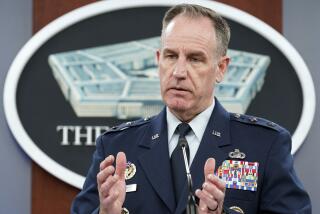Unjustified Use of Consultants by Arms Firms Reported
- Share via
WASHINGTON — A special Pentagon study released Friday uncovered what auditors called excessive and unjustified use of consultants by major defense firms.
A survey of 12 top arms manufacturers shows that they paid outside consultants $236 million last year for services ranging from marketing to engineering to lobbying. Defense Department auditors said $43 million of the charges--nearly a fifth--covered expenses that are not legally reimbursable in government contracts.
Ties to Fraud Inquiry
The audit included a number of the high-priced consultants investigated by Operation Ill Wind, the Justice Department’s inquiry into defense procurement fraud, and five cases of apparent illegality were referred to criminal investigators, the report said. Officials refused to say what the potential violations were or which of the 12 companies were involved.
The survey was prepared at the request of Defense Secretary Frank C. Carlucci in the wake of the sweeping Pentagon procurement scandal, which involves allegations that defense industry consultants paid Pentagon officials for inside information on contracts to be let for bids. Carlucci ordered the study in July to determine the extent of industry use of outside consultants and whether such services were justifiable.
The audit looked at the headquarters and 60 subsidiaries of the 12 firms: Boeing Co., General Dynamics Corp., Hughes Aircraft Co., International Business Machines Inc., Litton Industries Inc., Lockheed Corp., Martin Marietta Corp., McDonnell Douglas Corp., Northrop Corp., Raytheon Co., Unisys Corp. and United Technologies Corp.
Audit Questioned
The 12 companies as a group hold a third of all military prime contracts, with a value last year of $56.4 billion. Executives of a number of the companies Friday questioned the accuracy of the audit and said the findings raised questions about the competence of earlier surveys.
“We don’t feel there were any improper charges by Litton,” company spokesman John Georg said. Government auditors “are always in our facilities and certainly see how our money is spent . . . . They go through these (costs) and should catch them if they’re not allowable.”
William H. Reed, director of the Defense Contract Audit Agency, which conducted the survey, said the companies had taken advantage of loopholes in Pentagon contract language to hire a plethora of consultants without justification.
He said the Defense Department has proposed new regulations to govern the conditions under which it is allowable for a military contractor to hire an outside consultant.
“Our principles had some looseness to them, which was interpreted by industry as permissive,” Reed said. “That permissiveness has caused us great problems, and now it’s time to tighten up our principles.”
Reed noted also that auditors had found that a large number of the consultants were former high-ranking military or civilian Pentagon officials. Auditors found that in many cases the exact responsibilities of those ex-officials were not spelled out in consulting contracts.
The audit appeared to confirm charges by government investigators that consultants were paid hefty retainers chiefly because of their access to key Pentagon officials. The costs of those expensive middlemen were then included in contractors’ bills to the government.
“Contractors should be aware there is special sensitivity and certain statutes that must be complied with when employing former (Department of Defense) personnel,” Reed said. “It’s important to have good documentation for the services for which they retain these people.”
Many of the problems uncovered in the audit relate to poor documentation of why consultants were hired and exactly what they did. Auditors noted that companies often did not seek competitive bids for consulting contracts, hired consultants without written contracts, paid extravagant fees and did not properly monitor consultants’ work.
In addition, most of the companies could not prove that the same services could not have been provided by in-house personnel, the report said.
“We found some examples of weaknesses in every significant area of internal control,” the audit stated.
William Beckham, a Unisys spokesman, said the company had already recognized a number of the problems uncovered by government auditors and had moved to correct them.
“As a result of the discoveries from our investigation and the FBI investigation, we reduced down to basically zero the services of consultants related to the defense part of the business,” he said. “We reviewed the whole process and put into place a review for future agreements with consultants.”
More to Read
Sign up for Essential California
The most important California stories and recommendations in your inbox every morning.
You may occasionally receive promotional content from the Los Angeles Times.










